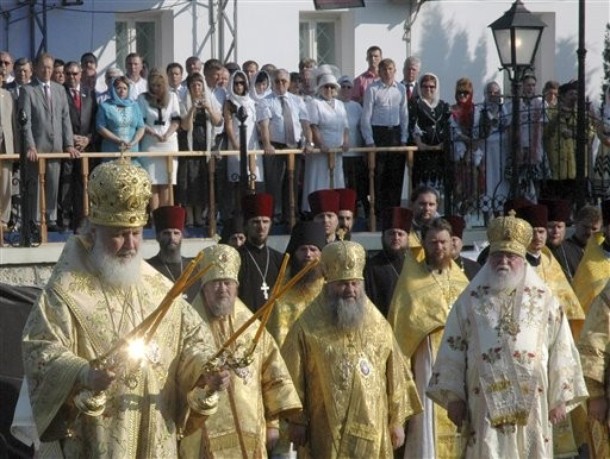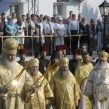
Russian Orthodox Patriarch Kirill Visits Ukraine
Publication: Eurasia Daily Monitor Volume: 6 Issue: 155
By:

Russian Orthodox Patriarch Kirill visited Ukraine from July 27 – August 5 in order to suppress the pro-independence mood among the local clergy and more broadly, to assert Russian religious and cultural domination. Kirill made it clear that he would oppose plans, backed by Ukrainian President Viktor Yushchenko, to create a local Orthodox church fully independent of Russia more energetically than his predecessor Alexy II. Kirill also allowed Party of Regions leader Viktor Yanukovych to use his visit to benefit Yanukovych’s presidential election campaign, which indicates that Moscow will probably back his bid as it did in 2004.
During his visit Kirill ostentatiously ignored the rival Orthodox Church of the Kyiv Patriarchate (UPTs-KP), although UPTs-KP Patriarch Filaret wanted to meet him. Adding insult to injury, Kirill acted as if UPTs-KP did not exist at all. Strictly speaking, this is the case from the point of view of the Moscow church as Filaret was excommunicated after he split from the Moscow church in 1992. UPTs-KP is still not officially recognized by the rest of the Orthodox world.
Yushchenko supports UPTs-KP, viewing it as the basis for establishing a single Ukrainian Orthodox church independent from Moscow patriarchs and Russian cultural influences. This would perfectly fit his idealistic model of a monolingual and monocultural Ukraine distanced from Russia as much as possible, which he has pursued since his election as president in 2004. This ideal is impossible to achieve in the modern world, and the same is probably true of Yushchenko’s dream of a nationwide independent church. Yushchenko failed to persuade Ecumenical Patriarch Bartholomew to recognize UPTs-KP last year as this would have spoilt relations between Bartholomew and the world’s largest Orthodox church in Russia, and Kirill flatly dismissed Yushchenko’s arguments.
When Yushchenko told Kirill that it is important to establish a single Orthodox church in Ukraine as this is also an issue of national sovereignty, Kirill said that such a church already exists and this is the Ukrainian Orthodox Church – Moscow Patriarchate (UPTs-MP) (Ukrainska Pravda, July 25). Kirill also said he was a patriarch for all the eastern Orthodox Christians regardless of their nationality or party affiliation (UNIAN, July 27). In line with Moscow’s official rhetoric, Kirill spoke a lot about the common roots of Russia and Ukraine dating back to the medieval Kyiv Rus. One of his chief ideologists, Andrey Kuraev, was more outspoken, threatening Ukraine with a civil war should a single church fully independent from Moscow ever be established (Ekho Moskvy, July 27).
In order to support the claim that he controls a single Ukrainian church rather than the church of the eastern and southern parts of the country where the Russian language and culture dominates, Kirill challenged UPTs-KP in its stronghold, the nationally-minded western Ukraine, visiting the regions of Rivne and Lutsk. Yushchenko’s secretariat reportedly warned him against the visit as UPTs-KP supporters planned protests there. Kirill used the warning to give an impression among believers with the help of the mass media that he was not welcome by Ukrainian officials, although the Ukrainian police and security service hurried to say that they did not advise Kirill against the visit (Interfax-Ukraine, August 2-3). Once Kirill eventually arrived in western Ukraine, the pro-Kremlin mass media in Russia and Ukraine’s most popular TV channel Inter, which also openly backs Yanukovych’s election campaign, presented this as Kirill’s moral victory.
Yushchenko’s dream of an independent church may be achieved only if UPTs-KP unites with the more numerous UPTs-MP. Kirill did everything possible during his visit to put an end to discussions about a possible unification with Filaret’s church among UPTs-MP clergy in Ukraine. He asserted that the Russian church should remain single "here and in the whole world." "We should be united around a common idea and the idea of autocephaly [independence] is not a common idea," he said in Kyiv (Interfax-Ukraine, July 29).
Kirill made it clear that he would reduce the role of UPTs-MP aging head Metropolitan Volodymyr in order to increase his own control of the local church. The Zerkalo Nedeli weekly said that Kirill promoted two Ukrainian regional archbishops to metropolitans, demonstratively breaking the tradition according to which such promotions were the responsibility of Volodymyr (Zerkalo Nedeli, August 8). UPTs-MP spokesman Archbishop Mitrofan said after Kirill’s departure to Moscow that discussions about the church’s autocephaly were over (UNIAN, August 6).
Demonstrating that he views Ukraine as part of the Russian space, Kirill ostentatiously refused to discuss local Ukrainian issues at the first ever sitting of the Russian synod in Kyiv. At the same time, he reported on a recent meeting of Russian religious leaders with President Dmitry Medvedev (UNIAN, July 27). Immediately on returning from Kyiv, Kirill met Medvedev to tell him that the "spiritual unity" existing between Russia and Ukraine "for millennia" "became a basic value that is not affected by political considerations" (Interfax-Ukraine, August 6).
Yanukovych used Kirill’s visit to the fullest extent. He met Kirill in Kyiv and accompanied him on a visit to his stronghold of Donetsk. Yanukovych compared himself favorably to the government of Yushchenko and Prime Minister Yulia Tymoshenko. Yanukovych alleged that they, "interfere in the affairs of the church, which is inadmissible, politicize religious matters and try to dictate to believers in which church to pray" (Ukrainska Pravda, August 3). Tymoshenko’s adviser Oleh Medvedev described Kirill’s tour as a visit of an imperialist who preached the neo-imperialist Russian World doctrine (Segodnya, August 6).




